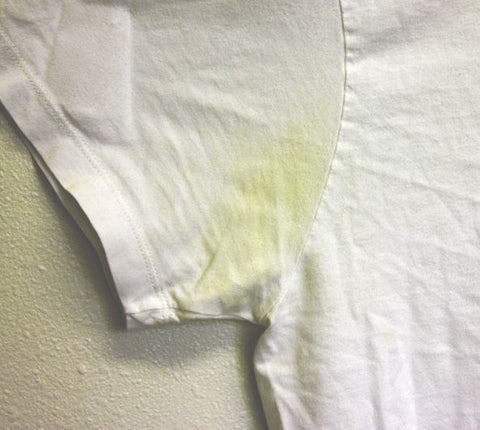Debunking Sweat Myths: Surprising Facts About Sweating You Might Not Know
It's odd being a deodorant company, especially when you realize that 8% of the U.S. population confesses they skip the deodorant aisle altogether! Most people prefer not to discuss what goes on under their arms, leaving deodorant, sweat, and body odor as hush-hush topics. Yet, in our line of work—what most consider private—is everyday business. This silence has brewed numerous misconceptions about why we even use deodorant to manage sweat. Are you ready to challenge what you think you know? Join us as we debunk the top myths about sweating and discover whether you’ve been misled about your body’s natural processes. Share your thoughts and any sweat-related questions you might have below!
Misconception #1: Sweat Stinks.
Not true. Sweat itself is simply water, salt, sugar, ammonia and urea (waste products). It's odorless. What causes odor are the bacteria that are present on the skin. These bacteria feed on the sweat and some of these sweat munching bacteria just so happen to produce what are called "thioalcohols" which are waste products of the bacteria. So, it's the waste from the thioalcohol producing bacteria that are responsible for your body odor.
You might be thinking "well then why do some people stink more than others"? The answer to that question resides in the bacteria present in the armpit. We're all different and everyone has different types and amounts of bacteria present on their skin. One person may have more of the thioalcohol producing bacteria than another. One persons underarm region's ph may be more comfortable and "homey" feeling for body odor causing bacteria than anothers. Finally, some people just don't like taking showers....and in that case, well, the bacteria population really doesn't matter that much.
What can you do about those BO producing bacteria? One thing you might consider is waging a little war against them. You can do this by using a probiotic deodorant such as Green Theory. By doing so, you're introducing good bacteria that doesn't produce stink which then competes for living space with all that bad bacteria.
Misconception #2: Sweat Stains Clothing.
*Buzzer sound* Wrong. Sweat does not stain clothing. What does stain clothing is the combination of sweat with commercial deodorant. Remember in the previous misconception we talked about the components of sweat with one of them being urea? Well, what happens is when you sweat and you're using a commercial deodorant antiperspirant is that urea from the sweat reacts with the aluminum in the antiperspirant and the results are the yellow stains you get in your white clothes.

So, how might you prevent "sweat stains" on your clothing? For one, don't use an antiperspirant. Sweating is natural and normal anyways plus, as we learned earlier, it doesn't stink. Make the switch to natural deodorant like Green Theory that doesn't interact with your sweat.
Another good idea is to wash out clothes that have a lot of sweat in them sooner rather than later. Letting them sit in the hamper for a week and all that exposure to oxygen will likely up your chances of getting sweat stains in your clothing.
Misconception #3: Sweat Is Sweat Is Sweat.
It would be easy to think that all sweat is created equal but that's definitely not the case. If you read our article on stress sweat, you learned about the two types of sweat glands, apocrine and eccrine.
The sweat you get from your body trying to cool itself off comes from the eccrine glands. This is what we traditionally associate with sweat however, there is another type of sweat with much more complexity to it.
The sweat that comes from apocrine glands is different. Apocrine glands only mature after the onset of puberty and are more of a signaling scent - like pheromones. This type of sweat contains less water than eccrine sweat (about 80% compared to 99%) and has fats and proteins in it.
Misconception #4: Sweat = Weight loss.
Ok, at the very basic level, yes, sweating does equal weight loss but it's not real weight loss rather just dehydration. We sweat during exercise as a method of maintaining body temperature....and that's it. Somehow the idea got associated that the sweat is equivalent to losing fat. While the act of sweating does mean that you are in a fat burning state, simply sweating does not make you lose fat (ie. a sauna).
When trying to lose weight, it's important to focus on the length of time in exercise rather than how sweaty you get. Different people sweat at different rates and so it has no correlation to quality of exercise or results.
While exercising, it's important to stay hydrated by drinking plenty of fluids before, during and after exercise. It's recommended that you consume about 8oz. of water for every 20 minutes of exercise. Performance has been shown to decrease at just 3% dehydration which impacts how you get through your exercise session.
Truth: Sweat Is Natural.
Sweating is totally normal. Everyone does it and it's nothing to be embarrassed about. Love yourself and being human. One great way to love yourself is to practice good self care habits. A great diet and exercise produce healthy and happy bodies. Use products that promote good health like Green Theory natural probiotic deodorant. It's made with all natural ingredients that uses the odor fighting power of probiotics to knock out odor. It also contains the dextoxifying benefits of bentonite clay that actually pulls toxins out of the body. Get yourself a stick and savor the fresh pits and peace of mind!
Who has some embarrassing sweat stories? Share them in the comments below!







Leave a comment